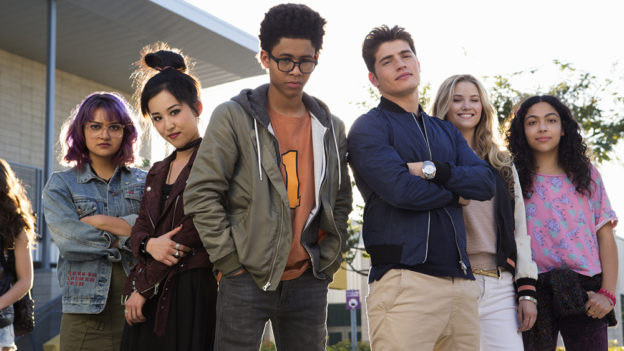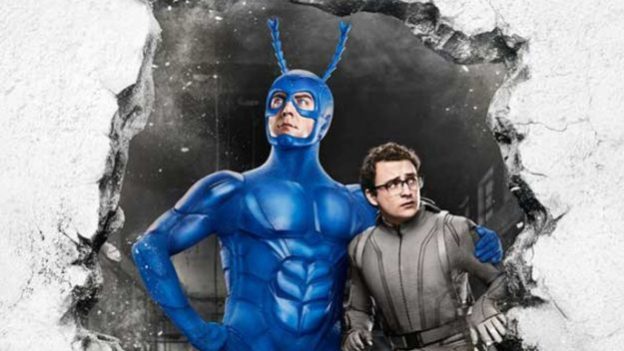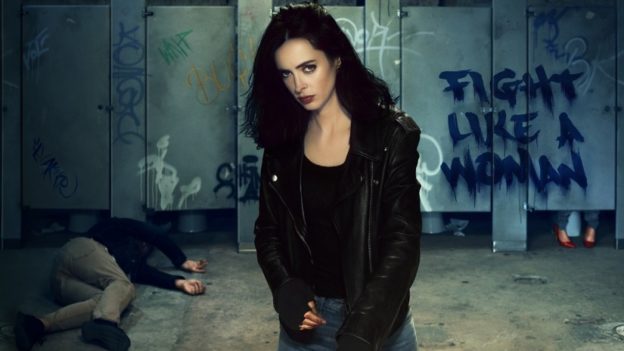Comic book TV is everywhere these days, and it’s happening all year. So I’ll hand out awards and rankings in June, but in the meantime, we’ll be reviewing shows one by one as they wrap up.
This installment: you know how teens begin to suspect their parents aren’t all that great after all? Well, what if your teen suspicions that your parents are jerks were way, way more correct than you ever thought? Based on the first Marvel comic to be written in the same seasonal model as TV shows, surely Runaways should be an easy fit for TV, right?
Right?
Short version: If you think the CW superhero shows don’t have enough teenage melodrama, does Hulu ever have a show for you. Well… half a show.
Premise
Alex Wilder, Gertrude York, Nico Minoru, Karolina Dean, Chase Stein, and Molly Hernadez used to be the best of friends, hanging out during meetings of their parents, a group of wealthy philanthropists called the Pride: tech dynamos, scientists, construction moguls, and the leader of the Scientology-esque religion Gibborim. High school and the apparent suicide of Nico’s older sister divided the gang, but Alex attempts to get everyone back together during the latest Pride meeting… only for everyone to witness their parents ritually sacrificing a teenage runaway Gibborim had plucked from the streets for “help.”
Turns out Pride is up to something far more sinister than building a new school, and are working at the behest of a mysterious and extremely jerky man named Jonah, with an unknown past that– he’s an alien. Total alien. If they don’t want to spell that out for you in ten episodes, I’ll just go ahead and rip the band-aid off myself. Now the teens are the only ones who can uncover Pride’s real goals and try to stop them… if they can put their personal issues aside long enough to make it happen.
Along the way, they pick up gifts to help with the fight. Nico’s mother has a magic staff called the Staff of One. Chase, with help from his inventor father, builds a set of powered gauntlets. Gertrude learns that her parents have a dinosaur that responds to her thoughts, no you read that right. Molly has super-strength, though using it tires her out. Karolina can glow, fly, and fire energy blasts when she takes off the bracelet her parents have made her wear her whole life. And Alex… well, Alex has to rely on his wits. There’s always one who just has to make a superpower out of being clever.
And eventually, they may have to run away. As the title suggests.
If anyone still cares somehow, no, there are no references to the larger Marvel universe. None. Not even the half-assed references you get from the Defenders shows. Runaways flies under the Marvel banner, because they’re not stupid, but narratively they stand alone. And good for ’em, says I.
Strengths
There were a lot of complaints about the story in early episodes, specifically the fact that the titular Runaways had yet to run away at all. Sure, in the comics, that happened immediately. In the first issue, they were learning about their parents’ villainy, and by issue two they were on the run. On TV, they take a bit longer to get there. Essentially, they’re doing the same thing as Preacher: they’re taking the first story arc and making a season out of it. They’re taking their time to explore where the story begins instead of rushing past it.
There are good and bad points to this approach, but the header suggests which one we’re going to talk about first.
Not jumping to the running away part of Runaways allows a much more complicated dynamic between the teens and their various parents, and in the Pride itself. It’s been many years since I read the first volume of Runaways, but I don’t recall there being much definition to the Pride beyond what exact brand of supervillain they were: gangster, magician, alien, mad scientist, etc. Here, there are far more levels. There are shades of grey: some of the Pride are more evil than others. Some take to the human sacrifice thing pretty easily. Some are mostly good people stuck in a bad situation. And also having their benefactor around in person changes things up as well. In the comics, the Gibborim were a race of goat-like aliens that had bestowed gifts on the Pride, which we didn’t even meet until the end of the first volume. Here, it’s Jonah. Instead of mysterious goat-beasts, it’s Nip/Tuck’s Julian McMahon, which allows for more complicated relationships between the various Pride members and their extremely dickish benefactor. Not everyone is a true believer, and that is definitely something new.
Also, we dig more into the parent-child relationships, as each child is forced to see their parents in a new light. Instead of instantly becoming mortal adversaries (save for one Runaway who was secretly on the Pride’s side, a storyline the show might or might not pursue), they try to hide their new knowledge and grapple with what it means. Some kids start feuding with their parents. Some actually get closer to theirs. It’s a complex tapestry and a more realistic approach than “Cheese it! We live on the run now!” being their opening gambit. Not to mention it lets more and darker secrets slip out as the season continues.
Other strengths. The bulk of the parents are well cast, including Buffy the Vampire Slayer’s James Marsters as the brilliant but abusive Victor Stein; Ever Carradine as his long-suffering wife; 24‘s Annie Wersching as Karolina’s cult-leader mother; Alias’ Kevin Weisman (love that dude, he’s great, his character on Alias was the best… well, the best non-Bristow) and Brigid Brannagh as Gertrude’s dorky, cheese-loving parents (and foster parents to Molly); and Angel Parker and Ryan Sands as the cold, unflinching Wilder parents, a gangster and a lawyer who got their piece of the pie through the Pride and will yield it to no one, possibly even Jonah.
The teen cast, though not always on the adults’ level, are spot-on for each of their roles. Well, except maybe Molly, who is written as several years younger, but doesn’t really look it. (Making her latina works well, and reduces the whiteness of the group from two-thirds to only half–still really white, sure, but progress?)
Combining the Gibborim and whatever species comics-Karolina was into one singular alien, Jonah, was probably a good idea. Really, how many types of aliens does this story need?
That’s a pretty great dinosaur Gertrude has.
And props for breaking from the canon, comic-book relationships and saying “You know what, the gay girl gets a win, too.”
Weaknesses
Multiple times in this first season, Jonah or a Pride member would get caught doing something Hell of shady, and they would stare down the person who caught them, saying (often with murder in their eyes) “You have to trust me,” while providing no real reason why that should happen. That is the show speaking to us, the audience. To explain, let’s look at the flip side of their use of the Preacher model.
Stretching the first Preacher story from four issues to ten episodes worked, mostly because of everything they layered into it, which made the first season feel like more of a complete story. Jesse had an arc whose natural end was leaving Annville in search of God. Not so much with Runaways. In a way, this plays out like the average season of Game of Thrones. The various plot points build to a big event in episode nine, then the season finale is all about dealing with the fallout while setting the stage for the next season.
The problem here, though, is that the first story arc of Runaways doesn’t translate as well to a full season. The first volume of Runaways was meant to read as the first season, not the first arc. As a result, what we have here is a first season that offers zero closure on almost any storyline. We don’t know what Jonah’s really after, or what he even is, Geoffrey Wilder’s frenemy rival is still an ongoing thing, I think they only barely dealt with “Who secretly killed who.” And that’s not even covering the fact that when the season wraps up, the main plot has only just made it out of first gear. The gradual pace of the first episodes was forgivable when I thought they were building to a satisfying climax, but then the finale rolled around and it turned out we’d spent ten episodes only introducing the premise.
And if you’re going to go the Game of Thrones route, with each season only being one part of a bigger, more complicated story, man, you gotta be Games of Thrones level good. Because when everyone else is doing season arcs with beginnings, middles, and ends and you’re opening with one chapter of a multi-year arc? That is a risky move, and in this case, it felt like Runaways was writing a cheque we don’t know that they can cash. They’re Jonah, staring us down and saying “You need to trust me,” when the last two episodes did not make it clear whether I can.
So the ending had some flaws. What else?
The dialogue is often not naturalistic, and instead really awkward. There might be a way to make “The circumstances of my sister’s suicide are not something you can keep secret from me” sound natural but goddamn they did not find it. Someone at the first table read needed to be flagging awkward dialogue, and it just wasn’t happening.
The younger actors are not always on the level of their adult counterparts. Well, mostly Molly. Molly struggles the most. Nico and Alex… they just can’t always deliver the really weirdly awkward lines convincingly. And that’s understandable, it is, but… Veronica on Riverdale doesn’t always have dialogue you believe a human teenager would say, but damn it Camilla Mendes still sells it.
They must have blown their effects budget on the dinosaur, ’cause those are some 80s-direct-to-video effects they’re using when Karolina lights up.
High Point
Either “Kingdom,” when the kids suit up for the first time, trying out their new toys (minus the dinosaur) to protect Alex and discover what they can all do, or “Doomsday,” in which the kids suit up to try and stop the Pride’s big plan, and confront their parents for the first… time… actually that confrontation ultimately fell pretty flat. Yup, it’s “Kingdom.”
Low Point
“Hostile.” For whatever strengths the season finale had, I came into it thinking “So how to you top ‘Doomsday,'” and the answer turned out to be “Well we don’t.” “Hostile” is an episode you break for Christmas with, not for the season.
MVP
James Marsters gives Victor Stein the most dynamic character arc of any Pride parent, and I’m most afraid for the safety of the Yorkes, so that’s bonus points to Kevin Weisman and Brigid Brannagh.
Ideally, the MVP would have been Alex, the unnamed leader of the team, but that just didn’t happen. Love his hair, though.
Tips For Next Season
We’ve had ten episodes of setting the stage. Now tell a story. (Also, don’t even think about writing out that dinosaur.)
Overall Grade: B-
Was almost a B+ but then they forgot to write an ending and here we are. Still too much potential in the show to slip into C territory, though.
Next time… ugh. Fine. Time to finish The Gifted. Also some non-TV blogs to even things out?
Photo: Hulu



